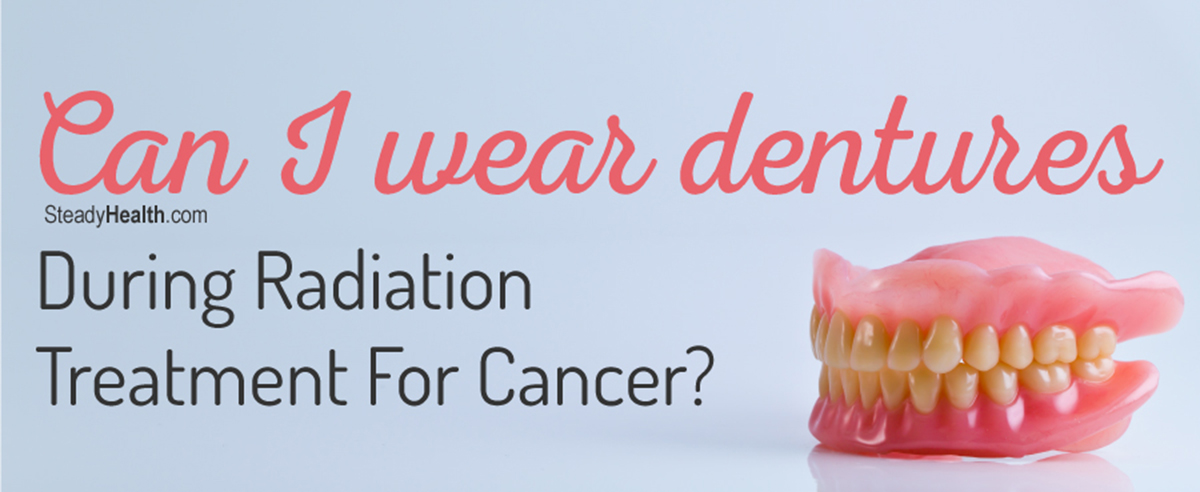Cancer is a life-changing disease and ends up affecting people in ways that they could never have imagined before it happened. Things that they never thought about can suddenly gain a lot more importance, and they have to incorporate a lot of changes in everyday functioning.
When we speak of cancers in the head and neck region, a lot of the side effects of radiotherapy and chemotherapy reflect in the oral cavity [1].
Some of the symptoms that the medical community identifies as the side effects of radiation include dryness of the mouth, pain, and difficulty in chewing, speaking, swallowing, and ulcers that take a long time to heal [2].
Patients are advised to take meticulous oral care during cancer treatment to minimize the side effects, but they also have to make certain concessions.

Dentures During Radiation Treatment For Cancer
It is extremely common for people to have one or more of their teeth missing and replaced with an artificial prosthesis, in fact, in older people it is not uncommon to see them completely edentulous and entirely dependent on these artificial replacements.
Dentures are commonly used to refer to a prosthesis that is Removable by the patient [3]. They may be:
- Complete dentures (replacing all of the teeth in the oral cavity)
- Partial dentures (that replace some of the teeth and work in close relation to the remaining natural teeth)
Unfortunately for those patients undergoing radiation therapy for cancer treatment or even only chemotherapy, they will most likely have to stop using these dentures altogether.
One of the side effects of radiation and chemotherapy is the loss of normal saliva production. The saliva keeps the mouth lubricated and moist, something that is essential to the normal function of dentures. In the case of a dry mouth, partial dentures can become extremely painful to wear and cause the formation of ulcers [4].
For complete denture wearers, in addition to the risk of developing wounds and injuries due to minor trauma, there is another problem which makes it very difficult for them wear dentures. Complete dentures rest on the underlying jaw bone and the palate. They do not have any teeth present for support or retention, and in fact, their primary mode of retention is through the suction created by tight contact [5].
For this suction to occur, a thin layer of saliva has to be present which in people undergoing radiation does not happen. This is why dentures that used to fit well before the treatment now suddenly slip off or appear to have become loose.
The third big problem for denture wearers during their cancer treatment is the occurrence of oral mucositis. The term oral mucositis refers to inflammation of the soft tissues inside the mouth. It is a painful condition which can make minor friction, mild spices or even extreme temperature very difficult to bear [6].
Mucositis is also extremely common and occurs in the vast majority of cancer patients. Under these conditions, wearing a denture can become next to impossible.
Up until now, we have only talked about Removable dentures because most people refer to them when talking about "dentures", however, the medical community also refers technically fixed prosthesis like bridges as partial dentures.
If your dentist feels that there are some sharp edges with the fixed partial denture, then they should be smoothed out before radiation begins. In some cases, patients are unable to maintain proper oral hygiene around these bridges, and so the fixed prosthesis may also have to be removed to try and protect the spread of bacterial infection inside the mouth [7, 8].
When Can You Restart Wearing Dentures After Radiation Treatment?
It is obviously not ideal to not be wearing your dentures, especially if they are all that you have to help you chew your food. Cosmetic appearance in these cases is also compromised, leading to social embarrassment for patients.
The time after which you can start using your dentures will vary with the degree of radiation you receive. For some people, the clinical side effects may reverse earlier while in some cases they may not reverse at all [9].
For patients that suffer complete destruction of the salivary glands, wearing dentures may never be possible again [10].
- Photo courtesy of SteadyHealth.com

